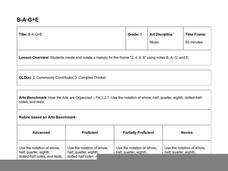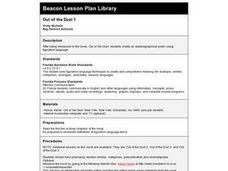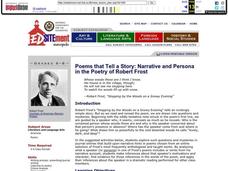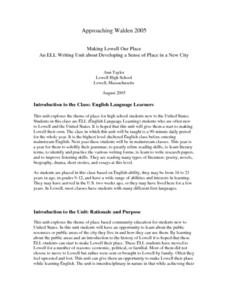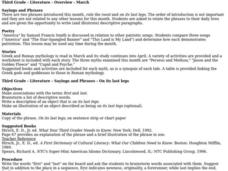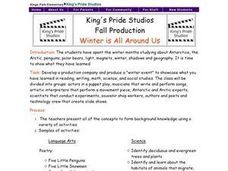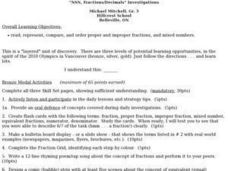Curated OER
Anglo-Saxon Period: An Introduction
Students read information about Anglo-Saxon rulers and literary techniques, then complete a worksheet to help them review. Students take notes about the oral tradition, Anglo-Saxon literary terms, and Anglo-Saxon poetry. Students create...
Facing History and Ourselves
What Shapes Your Identity?
Sixth graders explore their individual identities. In this personal identity instructional activity, 6th graders write biopoems using the provided template. Students share their poems and respond to the poetry shared.
Curated OER
Jazz in America
Young scholars participate in a class discussion about jazz music, compare improvisation with regular conversion, listen to various jazz musicians and compare and contrast their individual sounds.
Hawaiʻi State Department of Education
B-A-G+E
Budding musicians discuss rhythmic notation and melody as they play a bar instrument or recorder. They use the notes B, A, G, and E to play a simple melody, and then they use those same four notes to turn a poem into a song. They play...
Curated OER
Objectivity
Help young readers examine historic artifacts to determine if they were designed to help people survive or to create enjoyment. They identify objects that were designed to help people to survive and to enjoy themselves. Then compare and...
Curated OER
Out of the Dust 1
Pupils review figurative languages terms and examples. They read the first entry in the book, Out of the Dust, and discuss the images created by the author. Then they create an autobiographical poem using figurative language.
Curated OER
Cinquain Poems
Students write five-line, diamond shaped poems that are very easy to write then submit one through an automatic PIZZAZZ form.
Curated OER
Poems that Tell a Story: Narrative and Persona in the Poetry of Robert Frost
Pupils read and discuss poems by Robert Frost. Students collaborate in small groups to draw inferences about speakers' character and motives and to gather evidence supporting those inferences.
Curated OER
Much Ado About Something (Lesson 2)
Students view more video clips of Shakespeare's plays. They answer comprehension questions over the video. They are introduced to the language Shakespeare used as well.
Curated OER
The Importance of Rivers in the Development of Early Civilizations Importance of Rivers in the Development of Early Civilizations
Sixth graders explore the role of rivers in the construction of early civilizations. In this importance of rivers lesson plan, 6th graders listen to a poem written by Langston Hughes and work cooperatively to develop a graphic organizer...
Curated OER
Out of the Dust
Learners examine 1930's America through literature. For this Dust Bowl lesson, students read Karen Hesse's Out of the Dust and set up vocabulary journals and question bookmarks to log their thoughts and impressions as they read the novel.
Curated OER
My Deaf American Hero
High schoolers study and discuss famous deaf people that are role models for students who are deaf. They research a famous deaf American and create a ten frame multimedia presentation to showcase the information.
Curated OER
Reader's Theater
Students act out and interpret the story for their peers. They study the simplest form of an organized reading to a more elaborate activity involving props, costumes, or a reinterpretation of the narrative into another art form.
Curated OER
DRTA Activity
Learners practice predicting what is going to happen next in a story. They participate in different activities to help them with sentence structures. They finally take a quiz over what they learned in the lesson.
Curated OER
Action/Reaction: Art and Politics
Students examine three images that were responses to social and political turmoil World War I and II. In this political art lesson, students analyze and discuss the example art. Students create a word poem, a collage, and their own...
Curated OER
Superb Sonnets
Young scholars identify and compare the characteristics of both Italian and English sonnets. They read examples of each, then write an original sonnet in either the Italian or English style.
Curated OER
Culture in Atlantic Canada
Ninth graders discuss the aspects of culture and what makes them unique. In small groups, 9th graders use digital cameras to take photos. Groups use their pictures to create a PowerPoint presentation storyboard of their culture.
Curated OER
Making Lowell Our Place
Pupils investigate a community through different types of educational experiences. They use short field trips to experience the community in real life. they also conduct research using a variety of resources. Then students build the...
Curated OER
Mankind's Fascination With Flight
Students discuss, examine and appreciate the science and inspiration of flight. They study the terms and mechanics of powered flight and demonstrate that the heating of air makes it lighter and therefore rise. They discuss and...
Curated OER
Literature
Third graders study phrases, poetry and myths of Ancient Greece and Rome in these lessons.
Curated OER
Romeo & Juliet (Drama)
Ninth graders read and internalize the drama Romeo and Juliet by William Shakespeare. Many intriguing and thought provoking assignments are waiting for the completion of students within this lesson profile.
Curated OER
Winter is All Around Us
Students present what they have learned on Antartica. Students identify deciduous and evergreen trees and plants; identify and study about the habitats of animals that migrate, hibernate, and adapt; study the Aurora and Aurora Borealis...
Curated OER
"NSN, Fractions/Decimals" Investigations
Fifth graders engage in a "layered" unit of discovery. There are three levels of potential learning opportunities, in the spirit of the 2010 Olympics in Vancouver (bronze, silver, gold). The lesson plan is based upon fractions.
Curated OER
Rhyming Fruits and Vegetables
Students describe fruits and vegetables using rhyming verses. They discuss the Five Fruits and Vegetables a Day campaign and rhyming words, and create a rhyming riddle using the "Rhyming Riddles" worksheet.





